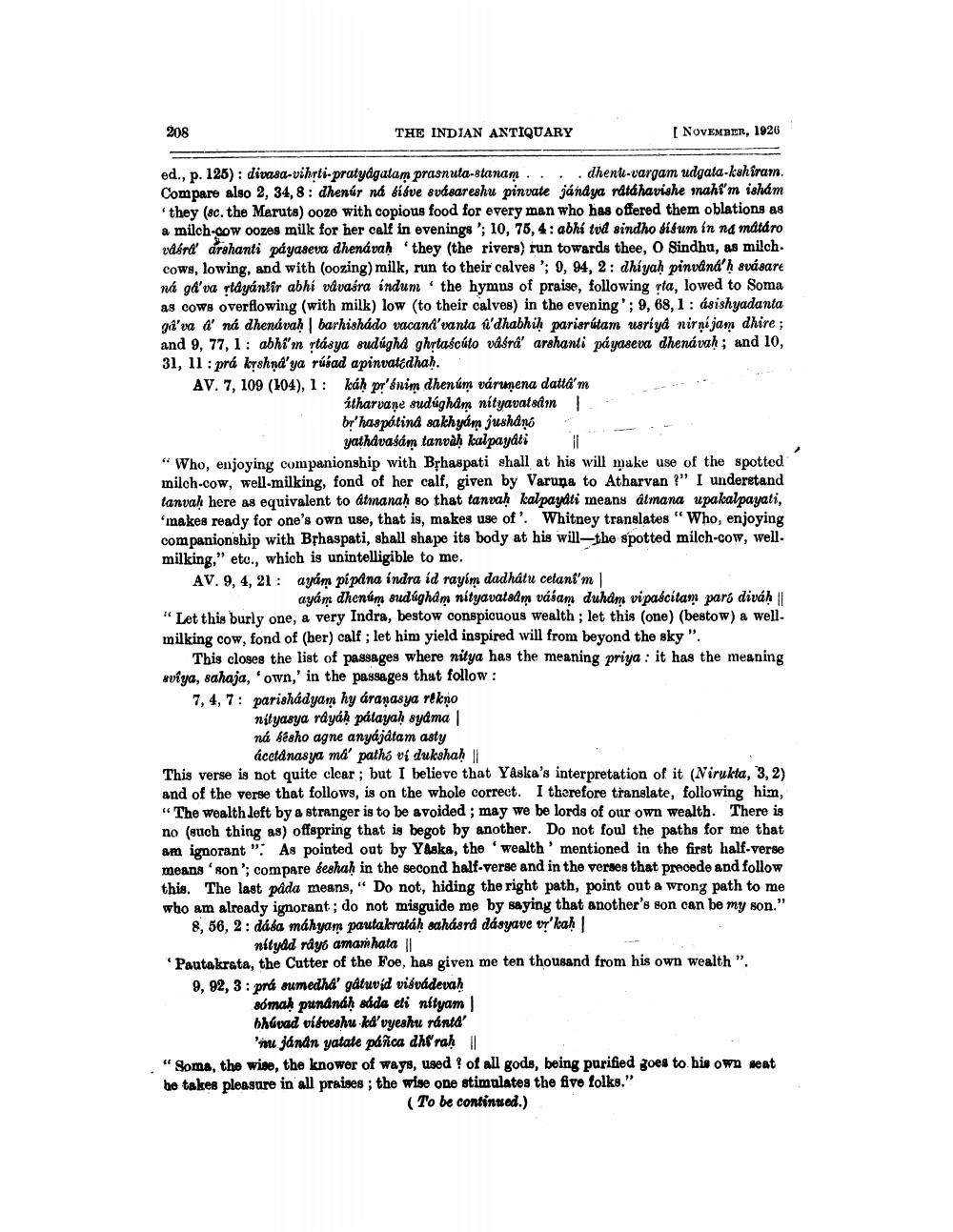________________
208
THE INDIAN ANTIQUARY
NOVEMBER, 1926
ed., p. 125): divasa-vihrli-pratyagatam prasnuta-stanam .... dhent-vargam udgata-kshiram. Compare also 2, 34, 8: dhenúr ná disve svásareshu pinvate jándya ndtahavishe mahf'm ishám
they (sc. the Meruts) ooze with copious food for every man who has offered them oblations as a milch-cow oozes milk for her calf in evenings '; 10, 76, 4:abhi tvd sindho difum in ng mátáro vdsrå arahanti páyaseva dhenavah 'they (the rivers) run towards thee, O Sindhu, as milchcows, lowing, and with (oozing) milk, run to their calves '; 1, 94, 2: dhiyah pinvåna' h svásare ná gå'va rtayántir abhi vdvasra indum 'the hymns of praise, following rta, lowed to Soma as cows overflowing (with milk) low (to their calves) in the evening '; 9, 68,1: ásishyadanta ga'va d' ná dhenavah barhishádo vacant'vanta fi'dhabhih parisrútam usriya nirni jam dhire ; and 9, 77, 1: abhi'ın rtásya sudúgha ghrtaścúto vásra' arshanti páyaseva dhenavah; and 10, 31, 11: prá krshnd' ya rúbad apinvatadhah. AV. 7, 109 (104), 1: káh pi'enim dhenúm várunena datta'm
Atharvane sudúgham nityavatsdm . b;' haspótind sakhyám jushånó
yathavasám tanvàh kalpayáti “Who, enjoying companionship with Bphaspati shall at his will make use of the spotted milch-cow, well-milking, fond of her calf, given by Varuņa to Atharvan ?" I understand tanvah here as equivalent to atranah so that tanvah kalpaydti means almana upakalpayati, 'makes ready for one's own use, that is, makes use of'. Whitney translates "Who, enjoying companionship with Bphaspati, shall shape its body at his will—the spotted milch-cow, well. milking," etc., which is unintelligible to me. AV. 9, 4, 21: ayám pípana indra id rayım dadhatu cetani'm
ayam dhenum sudúgham nityavatsám vásam duhdm vipascitam pars diváh || "Let this burly one, a very Indra, bestow conspicuous wealth ; let this (one) (bestow) a wellmilking cow, fond of (ber) calf; let him yield inspired will from beyond the sky ".
This closes the list of passages where nitya has the meaning priya : it has the meaning sviya, sahaja, 'own,' in the passages that follow : 7,4, 7: parishádyam hy áranasya rtkno
nityasya räyák patayah sydma ná tésho agne anyájátam asty
ácetdnasya ma' pathó ví dukshah || This verse is not quite clear ; but I believe that Yaska's interpretation of it (Nirukta, 3,2) and of the verse that follows, is on the whole correct. I therefore translate, following him, “The wealth left by a stranger is to be avoided ; may we be lords of our own wealth. There is no (such thing as) offspring that is begot by another. Do not foul the paths for me that am ignorant ". As pointed out by Yaska, the 'wealth ' mentioned in the first half-verse means 'non'; compare teshaḥ in the second half-verse and in the verses that precode and follow this. The last påda means, "Do not, hiding the right path, point out a wrong path to me who am already ignorant; do not misguide me by saying that another's son can be my son." 8, 56, 2: dáda máhyam pautakratáh sahásrd dásyave vy'kah
nitydd ndyo amamhata il Pautakrata, the Cutter of the Foe, has given me ten thousand from his own wealth ". 9, 92, 3 : prá sumedha' gatuvid visvádevah
sómak pundnah adda eti nityam bhuvad vitueshu - kd'vyeshu rántá'
'me jándn yatate pánca dh'rah | “Soma, the wise, the knower of ways, used ? of all gods, being parified goes to his own seat he takes pleasure in all praises ; the wise one stimulates the five folks."
(To be continued.)




